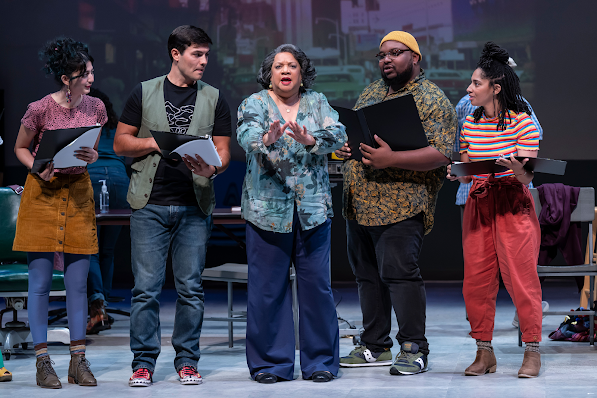Something Moving: A Meditation on Maynard, Ford's Theatre, Washington, DC
A cast list that includes one named character (“The Witness”) and nine others named Citizen 1, Citizen 2, etc. indicates right away that Something Moving: A Meditation on Maynard is not a traditional, representational play. Indeed, as playwright Pearl Cleage explains in the program note:
“It’s not a play with a conventional structure because it’s really a poem masquerading as a play…
It’s really a song masquerading as an oral history…
It’s not a comprehensive history of America because it’s really a memory seated primarily in the heart… “
Set in a contemporary former public school turned arts center, The Witness enters, pulling a little red wagon with a number of implements that will be used. She explains that a cast has been assembled to present memories of Maynard Holbrook Jackson, Jr., who became the first African American to be elected as Mayor of Atlanta (or any large Southern city), at the age of 35, 50 years ago this month. She pulls out a slide carousel to provide us with a bit of orientation as to who Maynard Jackson was and why his election was such a significant moment, not just in Atlanta’s history, but in the progression of the civil rights movement in this country.
Nine actors enter. None has a firm grasp of what they are doing there. They are told that they are to portray “Citizens,” with The Witness informing them that Citizenship is something of a sacred calling. There is nothing remarkable about the group, which is, in itself, remarkable. One might have expected that the subject matter would be presented by an all-African American cast, but this cast is diverse, both multicultural and intergenerational. They will represent a variety of ages, races, classes, ethnicities, religions, and sexualities. Over the course of 90 minutes, they present us with glimpses of numerous characters, emphasizing that Jackson’s election reverberated in a variety of different communities across the city.
The Witness and the citizens speak often of Atlanta as “our town,” not “our city.” By 1973, the city proper boasted a population of just under half a million people, but significantly these citizens see it as something more intimate than a city or even a community: a town.
We learn some facts and figures about Atlanta, but more than that, we develop an understanding of the town at this historical turning point, in part because Jackson himself tries to understand what the citizenry faces in terms of everyday life. Jackson, we are told, takes up a lot of space, physically and emotionally, but he throws himself into visiting various communities, spending a weekend in public housing and visiting a gay bar. Jackson “sees” communities that previously have been (or at least have felt) invisible to city leaders.
Playwright Cleage, who served as a speechwriter for Jackson in his first successful mayoral campaign, is careful not to turn him into a hero without flaws or contradictions. He finds himself making difficult decisions: having stood with striking sanitation workers while serving as vice mayor, he faces the realities of governing as mayor and finds himself having to fire the strikers. In his three terms as mayor, we understand that Jackson’s work strengthened the city’s status on the world stage, but also endured a series of murders of Black children and young adults. Wisely, Cleage does not make use of Jackson as an on-stage presence, allowing us to fill in the blanks based on photographs and what we learn about him as a larger-than-life personality.
Director Seema Sueko elicits truthful performances from her cast. Each of the actors has one or more significant moments in the spotlight. Billie Kershawn sets the standard in a strong performance as The Witness, leading the actors cast as citizens into their roles and keeping them on track. I especially enjoyed Kim Bey and Susan Rome in their knowing interactions as the maid and an Atlanta matron who makes a series of inept attempts to recognize the maid’s status as a “member of the family,” with calamitous (and fittingly funny) results. Doug Brown brings sly humor and panache to his role, learning that “Karma is a bitch” could be more appropriately (and less offensively) re-stated as “What goes around comes around.” Alina Collins Maldonado and Constance Swain as an interracial, gay couple walking their dog represent the changes in Atlanta’s world view. Derek Garza, Shubhangi Kuchibhotla, Shaquille Stewart, and Tom Story complete the cast.
Milagros Ponce deLeón’s scenic design is recognizably real and delightfully detailed, supplemented by Shawn Duan’s projection design. Each performer has an appropriate “look” as actors assembled for a rehearsal for an unfamiliar show. Jeanette Oi-Suk Yew’s lighting design uses subtle changes to transfer our focus, though at the performance I attended, several of the lighting cues appeared to have been mistimed.
Something Moving fits well in The Ford’s Theatre Legacy Commissions, a new artistic initiative focusing on plays about social justice, civil rights, and equality written by playwrights who are Black, Indigenous, and People of Color. The play’s exploration of the life and legacy of Maynard Jackson, whose story and influence reach beyond the city limits of Atlanta, fits all of the criteria for the Commissions.
The audience was sparse at the performance I attended, but was generous in their applause for the cast and production. I hope it will find a wider audience: the company tells its story well and the story should be heard.
The cast of Something Moving: A Meditation on Maynard. Photo by Scott Suchman.







Comments
Post a Comment